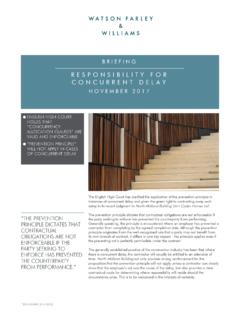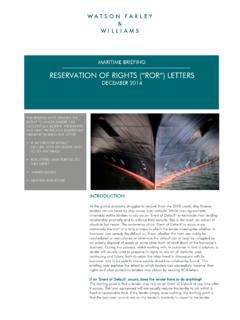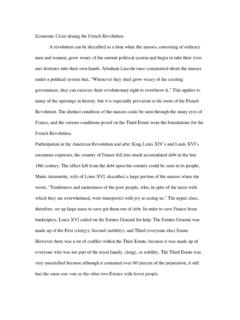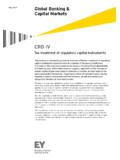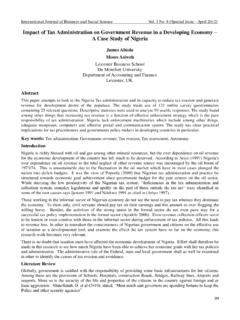Transcription of NEW FRENCH TAX RULES FOR 2018 - Watson Farley & Williams
1 The FRENCH Parliament adopted new important tax measures regarding corporate and individual income tax in two finance bills dated 29 December 2017. CORPORATE TAX Reduction in the standard corporate income tax ( CIT ) rate The Finance Bill for 2018 progressively reduces the standard CIT rates from to 25%. The new 25% rate will apply to all companies as of 1 January 2022. The timetable is as follows: From January 2018, the new 28% rate will apply to all companies on the first 500,000 of taxable income earned over a 12 month period. Taxable income exceeding 500,000 will still be subject to the rate; From January 2019, the new 28% rate will apply to all companies on the first 500,000 of taxable income earned over a 12 month period.
2 Taxable income exceeding 500,000 will be subject to the new standard rate of 31%; From January 2020, the 28% rate will apply to all companies taxable income; From January 2021, the rate will apply to all companies subject to FRENCH CIT; and From January 2022, the 25% rate will apply to all companies subject to FRENCH CIT. The current reduced CIT rate of 15% will still apply to small and medium-sized enterprises ( SMEs ) for taxable income of up to 38,120 per annum. BRIEFING NEW FRENCH TAX RULES FOR 2018 JANUARY 2018 FIRST NEW FINANCE BILLS SINCE LAST PRESIDENTIAL ELECTION THE FRENCH CORPORATE INCOME TAX RATE HAS BEEN REDUCED.
3 FROM 2022, THE STANDARD RATE WILL BE 25%. 2 Watson Farley & Williams New tax RULES for restructuring operations The favourable merger tax regime set out in Articles 210A to 210C of the FRENCH Tax Code was previously subject to a tax ruling procedure before the FRENCH Tax Authorities when the restructuring operations involved a foreign company. The Court of Justice of the European Union ruled that this tax ruling was contrary to the right to freedom of establishment in a decision on 8 March 2017 (CJEU, No. C-14/16, Judgment of the Court, Euro Park Service v Minister of Finance and Public Accounts).
4 In order to comply with European Union ( EU ) law, the Amended Finance Bill for 2017 abolishes said tax ruling procedure for cross-border restructuring operations as of 1 January 2018. A new specific tax return will now have to be completed and foreign companies will have to declare a FRENCH permanent establishment, including any FRENCH assets/liabilities transferred to its profit; The new law also provides for an anti-abuse clause deriving from the EU Merger Directive denying the favourable merger tax regime to operations driven by tax evasion or avoidance considerations.
5 The Amended Finance Bill for 2017 also creates a new procedure in order to obtain a prior confirmation from FRENCH Tax Authorities that the envisaged cross-border restructuring operation does not fall within the scope of FRENCH anti-abuse RULES ; The scope of restructuring operations eligible for the favourable merger tax regime has also been extended. A contribution of shares reinforcing an existing controlling situation will now be assimilated to a contribution of a complete and autonomous branch of activity eligible to the favourable merger tax regime; and An old rule providing for a three year shareholding period, which was applicable at the level of a company contributing a complete and autonomous branch of activity under the favourable merger tax regime, has been abolished.
6 The contributing company is no longer required to keep the shares received in exchange for a three year period. Non-deductibility of taxes levied abroad pursuant to the provisions of double tax treaties As a general rule, the Amended Finance Bill for 2017 provides for the non-deductibility in France of taxes levied abroad in accordance with the provisions of bilateral tax treaties concluded with France. Consequently, a FRENCH company in a loss making position or with no sufficient taxable result is not entitled to offset the amount of taxes levied abroad against future corporate tax and will lose the benefit of this tax credit.
7 This rule does not apply to foreign taxes levied in a country which has not entered into a double tax treaty with France. Surprisingly, this new rule seems to be more favourable to FRENCH companies receiving income from a non-treaty jurisdiction. The New FRENCH Tax RULES for 2018 3 Changes in the Carrez rule Introduced in 2011, the Carrez rule limits the deductibility of interest expenses relating to the acquisition by a FRENCH company of a controlling stake in another company. Under this rule, the deduction of related financing costs is not allowed for an eight year period if the decisions and the control related to the acquired company are not managed at the level of the FRENCH acquiring company.
8 The Finance Bill for 2018 provides for a change in this anti-abuse rule by allowing the acquiring company to prove that decision or control is managed by a company established in a Member State of the EU or EEA that has concluded with France a double tax treaty including a clause against tax fraud and evasion. This new rule applies to corporation tax due for the FY ending on 31 December 2017. Changes to the CICE The tax credit for competitiveness and employment ( CICE ) is a tax benefit based on a percentage of a company s payroll (excluding wages exceeding two-and-a-half times the FRENCH minimum wage SMIC), and can be directly offset against the CIT.
9 The Finance Bill for 2018 reduces the rate of the CICE from 7% to 6% from January 2018 and provides for its replacement by a reduction in social security contributions from 2019. Company Added Value Tax ( CVAE Contribution sur la Valeur Ajout e des Entreprises) The CVAE is a local tax based on a company s added value. The tax rate for companies whose turnover ranges from 500,000 to 50m is assessed according to a sliding scale which ranges from 0% to For companies which are members of a FRENCH tax consolidated group within the meaning of Article 223 A and seq.
10 Of the FRENCH tax code, the law formerly provided that the applicable tax rate had to be calculated with reference to the global turnover of the members of the fiscal unity. This provision was invalidated by the FRENCH Constitutional Court on 19 May 2017, which ruled that it created an unjustified difference of treatment between those companies which are members of a tax group and those which are not. The Finance Bill for 2018 provides that the global turnover of companies has to be retained if companies meet the conditions for joining a tax group, whether or not said companies are actually member of a tax group.



